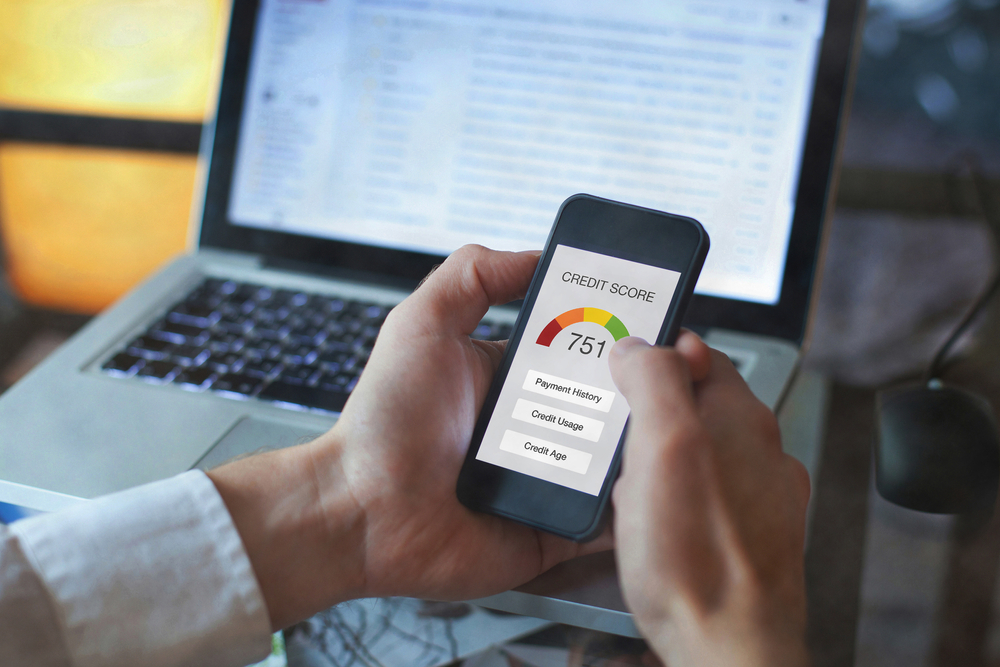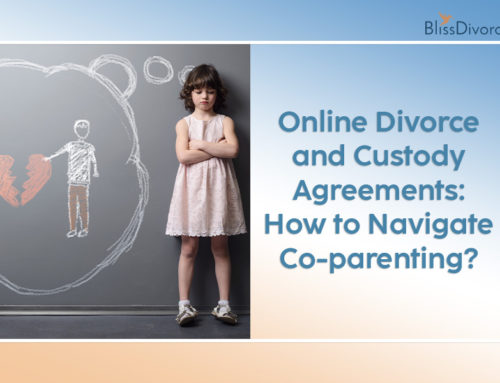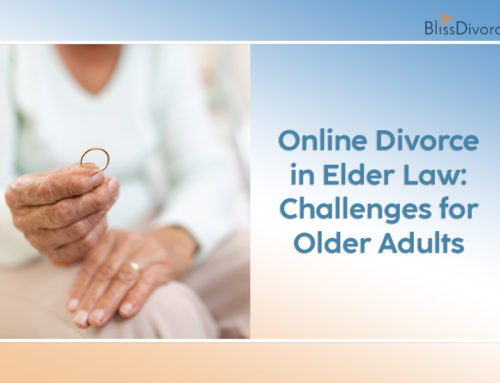Please note that all online divorce platforms are not the same. Much of the content below does not apply to BlissDivorce. BlissDivorce is the only complete online divorce solution, including property division, child custody, spousal support, and AI-powered Digital Divorce Mediation.
Getting a divorce already puts you and your spouse in a highly stressful environment. Adding to it, the worries for your financial future will surely elevate your stress level to new heights.
After a divorce, many things may change, including the financial comfort levels both spouses enjoy. You will feel the financial effects if you go from a combined household to a single income.
With online divorce, you can avoid the extra financial strain of costly lawyers and court fees. Instead, you and your spouse may reach an agreement fair for both parties. But what about online divorce and your credit score?
Let’s see what you may expect in terms of your credit score.
Online Divorce and Your Credit Score
It is important to know that a divorce does not directly impact your credit score, as marital status does not appear on credit reports. But your credit report does record all joint accounts.
So, if there are accounts with your spouse that you jointly own, are a cosigner on, or are authorized to use, you must settle them before your divorce.
As you can see, divorce does not affect your credit score. Rather, it is the changes that occur during and after the divorce.
The following things can affect your credit score:
- Closed accounts
- Late or missed payments
- Increased debt
You may lessen some financial hits if you and your spouse split amicably, which is possible with the aid of an online divorce service. This means that you avoid going to court and involving expensive divorce lawyers.
The high rates charged by lawyers will, without a doubt, impact your credit score. The best way to protect your financial future is to avoid involving divorce lawyers.

Source: shutterstock.com / Photo Contributor: NicoElNino
Factors that May Negatively Impact Your Credit Score
Things like assets division, spousal, and child support may affect your finances during the divorce. None of these things have a direct impact on your credit score.
Credit scores range between 300 to 850, with a good credit score between 570 and 739. With a good credit score, you are eligible for better interest rates and are considered a lower risk by creditors and banks.
But, what may negatively impact your credit score are some additional factors that happen during the divorce. Some factors that can cause your credit score to plummet are the following.
Closed accounts
Credit scores may drop if your or your spouse’s credit score is built mainly on the joint accounts you close during the divorce. This is because the number of open accounts, credit history, and the types of open accounts you have all affect your credit score.
The length of your credit history impacts 15% of your FICO score. So, for example, if your oldest account is a joint one that you need to close due to the divorce, you lose the history. By closing the credit history of joint accounts, your score may likely suffer.
Another impact on your score may be loans and debts. Paying off or closing these accounts limits the active loans under your name.
Late or missed payments
All debt you incur throughout your marriage is also part of shared property. If you reside in a community property state, like California, remember they divide assets and debts 50/50. While in other states, the judge may put the responsibility of debt repayment 100% on one spouse.
But, this leads to the false assumption that one spouse is completely absolved of all responsibility in shared debts, which leads to credit issues. If you co-signed the original debt, be it mortgage, credit card, or car payment plan, you are still responsible for ensuring it gets paid.
If the spouse named in the divorce decree as the party responsible for the debt fails to repay it, both parties’ credits might suffer. Your name is still on the original debt contract, which is impossible to change. So, make sure to always keep track of debts with your name.

Source: shutterstock.com / Photo Contributor: Bigc Studio
Increased debt and expenses
When spouses do not get along, they end up in court to settle their differences. But with the current national average cost of divorce sitting at $25,560 per spouse, especially in contested cases, the consequential financial hit is enormous.
The best way to avoid a big hit on the family finances is to find a way to work things out in a civil manner between you and your partner.
If you cannot agree on your divorce, the cost of divorce may leave you with increased debt. The debt and the inevitable expense increase once you move to a single-income household may negatively impact your credit score.
For example, one study found that divorce drops a person’s wealth by 77%.
Online Divorce and Credit: Ways to Protect Your Financial Future
If you want to split up on good terms and protect yourself financially, you and your spouse should be open and work together. By getting an online divorce, you avoid going to trial and adding more stress to an already turbulent period.
You and your spouse should thoroughly discuss the current state of your finances. Divorce mediation is always possible to help ease tension-filled conversations.
Go through your credit report
You can request a credit report from the three major credit bureaus, Equifax, Transunion, and Experian. You are entitled to one free credit report every year. You may request a credit report from each credit bureau, as each may have a different score and account.
Checking each credit report allows you to see the information each bureau has. Also, you can easily find all your joint accounts to deal with accordingly.
Close all joint accounts
After you decide to divorce, it is important that you close all joint accounts. While the debt accumulated on the joint accounts is the responsibility of both spouses, they must be closed or frozen during the divorce process.
If any joint accounts remain open, your spouse can add more debt, for which you will also be responsible.
Keep track of your monthly expenses
As mentioned above, divorces are expensive, and with your resources split in half, adjusting to your new financial situation may take a while. During your divorce and the first couple of months after it, it is best to make a budget plan and stick to it.
With a monthly expense budget, you can easily track your financial situation. Once you have a clear picture of your finances, you can see the possible improvement areas.
Consider cutting back temporarily on non-essential purchases and costs, as they may help ease the financial burden of your divorce.
Make your payments
You must keep up with the monthly payments on existing joint accounts. You want to avoid missed or late payments as they affect your credit score. If you haven’t closed all joint accounts, you will need to work out how to divide the payments with your spouse.
Remove authorized user
Remember to remove your spouse if they are an authorized user on your credit card. If you have your spouse as an authorized user on your credit cards, it means they can use it without being responsible for repayment.
Leaving a spouse as an authorized user during a divorce can lead to trouble. It is best to avoid your spouse running up the balance on your credit cards in a moment of anger.
Start Rebuilding Your Credit Score
If your credit was bad before marriage or you have no credit history outside of joint accounts, it may negatively affect your credit score after divorce. The best way to protect your financial future is to rebuild your credit score.
The following steps are the best way to build a good credit score:
- The first step is to resolve and pay joint debts. You and your spouse should determine how to divide the debt on your joint accounts. Dividing joint debt will make it easier for both parties to pay off and close joint accounts.
- Next, ensure that you monitor your credit score and credit report regularly. Monitoring your credit report lets you know what you are financially responsible for.
- Ensure that you keep the credit utilization ratio low. You should keep your credit utilization ratio under 30% when your finances are in bad shape.
- Lastly, start to build a credit history of your own. You can start building your credit history by applying for a credit card in your name only. Once you have your credit card, make small monthly purchases and pay them off. With a history of consistent payments, your credit score may increase over time.

Source: shutterstock.com / Photo Contributor: Song_about_summer
Conclusion
If you want to avoid the high cost of divorce trials, you and your spouse should seek an online divorce. But you may wonder how online divorce and your credit score work together.
With an online divorce, you may avoid extra debts, lowering the chances of your credit score being hit after your divorce.
Even though divorce does not directly impact your credit score, its costs may significantly dent your finances. Online divorce allows you to protect your financial future and also your credit score.



